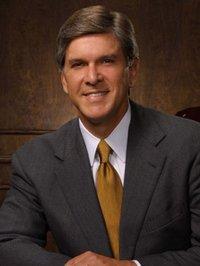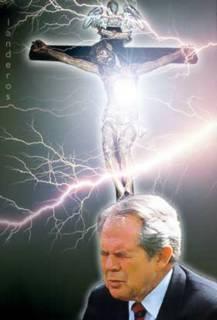
The fact that John Edwards is the first “front tier” candidate to declare his intention to run for president is newsworthy in itself, but the way he chose to make his announcement was even more so.
Standing in blue jeans and work boots in a New Orleans neighborhood devastated by Katrina, he spoke of poverty and citizen activism. The location was chosen because, to him, it symbolized his campaign theme of two Americas and was exemplary in both positive and negative senses, as a symbol of citizen action and government inaction. It symbolized “the power of ordinary citizens to take responsibility for their own futures” but it also symbolized the government’s incompetence in the aftermath of Katrina and its refusal to treat the issue of poverty as a moral imperative.
More and more, Edwards has become reminiscent of another Democratic presidential candidate from 40 years ago. And although John Edwards and Bobby Kennedy will ultimately be defined by the times in which they lived, their similarities may outnumber their differences. Each were tempered by a personal tragedy that fundamentally altered their life, and each (at the time of their presidential campaign) was a one-term senator with youthful good lucks, personal wealth, a fairly liberal voting record, and a thick accent that highlighted their regional upbringing. Moreover, each led a campaign focused on the issue of poverty that called on all Americans to do their part and to be patriotic for “something other than war.”
But it’s also true that Edwards doesn’t necessarily embody all of which made Bobby Kennedy who he was. After all, we may never see another candidate capable of invoking that same level of passion among the electorate. We knew Bobby too well. Because of his family, he was constantly under the spotlight. We watched him achieve unprecedented professional success at a young age, and we watched him suffer through overwhelming personal tragedy. Many supported him and what he represented, but many others felt personally vested in him. When war and bigotry divided our country, he was the one we turned to. He was the standard bearer of hope and reassurance capable of uniting us again. After Martin Luther King, Jr. was killed, it seemed as if he was the only one left.
 To the impoverished mining families of Appalachia, it may have initially seemed awkward to bear their soul to a young millionaire senator from New York, but that feeling soon faded. For once, someone was there to listen; someone who embodied compassion and sincerity and strove to not only speak, but to act on their behalf. And he had the ability and influence to make good on his promises. Far from a phony, he was a saint. He became an advocate for those with no voice of their own; a true champion of the people.
To the impoverished mining families of Appalachia, it may have initially seemed awkward to bear their soul to a young millionaire senator from New York, but that feeling soon faded. For once, someone was there to listen; someone who embodied compassion and sincerity and strove to not only speak, but to act on their behalf. And he had the ability and influence to make good on his promises. Far from a phony, he was a saint. He became an advocate for those with no voice of their own; a true champion of the people.Today, Edwards (the southern populist) speaks to that same issue but it’s unclear how effective he will be. After all, the issue of poverty is looked upon quite differently than it was 40 years ago. Unlike RFK and to his credit, Edwards is actually a product of humble beginnings (a mill worker’s son) and can credit his ambition and hard work, not his family estate, for his personal wealth. In fact, it is a wealth earned from years of representing the interests of everyday Americans who fell victim to powerful corporations and insurance companies. As a result, representing the powerless is natural to him because it’s an issue that he knows all too well. Long before Katrina brought renewed attention to the issue of poverty, Edwards was speaking on behalf of impoverished America and highlighting the moral responsibility of our government to provide for those less fortunate. In February of 2005, his efforts led to the establishment of a Center on Poverty, Work and Opportunity at the University of North Carolina at Chapel Hill.
Depending upon its resonance with the American people, I’m hopeful that Edwards can adapt his message effectively throughout the upcoming campaign. But in doing so, it’s imperative that he not undermine the needed focus and moral clarity that conveying this message provides. The issue of poverty is conspicuously absent from today’s political discourse and the people are desperately looking for a capable new voice, a new champion. Like Bobby Kennedy 40 years ago, John Edwards may be the only one left for us to turn to.





